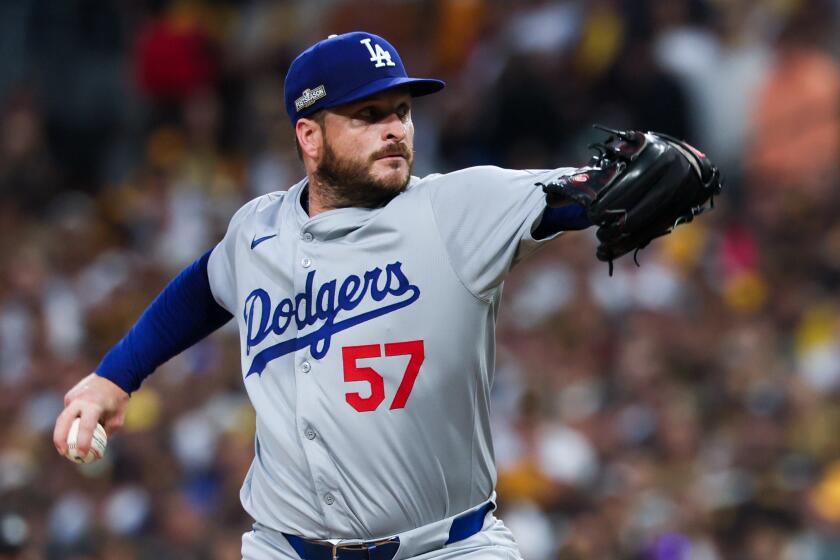Owners, Players Find Shared View on Time
- Share via
The baseball players’ union failed to respond to the owners’ latest revenue-sharing proposal during a series of collective bargaining sessions Thursday, but the sides--in a surprisingly positive perspective--agreed they have plenty of time to resolve the remaining issues before the union’s Aug. 30 strike date.
In fact, Rob Manfred, management’s lead labor lawyer, said it is strictly a matter of resolving numbers now because there is agreement on the structure of both the revenue-sharing distribution and payroll tax, the two biggest issues among several still on the table.
Neither the tax--still a potentially deal-breaking hurdle--nor revenue sharing was discussed Thursday, but Manfred called it a productive day in which 20 pages of complex language relating to the issue of debt servicing by individual clubs was finalized, and non-economic subjects such as scheduling, interleague play and the assignment of contracts were discussed.
Manfred also said there was a “good conversation” on how and when the union will respond to the owners’ Tuesday offer that reduced their revenue-sharing proposal from $282 million to $268 million, and he is “mildly optimistic” that response will come soon.
The union often takes a cynical view of Manfred’s positive twists, but union lawyer Steve Fehr, the brother of Executive Director Don Fehr, agreed with Manfred that there is plenty of time to resolve the remaining issues.
“They can be resolved within a day if the commitment is there,” he said. “I’m not saying they will be resolved within a day, only that the issues have been narrowed sufficiently that they can be resolved in a much shorter time [than the seven days before Aug. 30].”
Steve Fehr agreed with Manfred’s perception that the union soon would respond to the revenue-sharing proposal (perhaps today, but more likely on the weekend) and said, “Hopefully, resolving what’s left to resolve on revenue sharing won’t be difficult.” The players have proposed shifting $235 million from the high-revenue clubs to low-revenue clubs, meaning there is a $33-million difference that would seem to be easily bridged. The union already has agreed to the owners’ straight-pool method of distribution, which would divide the money evenly among the 30 teams.
The tax issue is more contentious. The union considers the two-tiered element of increased revenue sharing and payroll tax equivalent to a salary cap and, as Don Fehr recently wrote in a memo to players and agents, an all-out assault on the salary structure.
However, Manfred said that with the tax, like revenue sharing, the sides have made “great strides” in the structuring and “what differences remain are strictly differences in the numbers.”
The tax numbers, however, are more complicated than the $33-million revenue-sharing difference. Although owners have accepted the union’s concept that, as Manfred put it, “the more times you exceed the threshold, the harder you get hurt,” there are wide differences over the triggering threshold and rate of tax, and the ability to bridge those differences holds the key to a settlement before Aug. 30. In addition, the owners’ quest to have the tax cover four years compared to the union’s willingness to go only three is another potential problem.
On Thursday, as part of finalizing the debt-service package, there was one important concession by management, according to a source. The debt owed players, deferred and otherwise, will not be counted in the 60-40 tabulations that require clubs to have 60% of their value in assets and not more than 40% in debt. The union had been concerned that by including player debt in the formula it would restrict spending.
The union is expected to brief its executive board on the status of the talks in a conference call today.
More to Read
Are you a true-blue fan?
Get our Dodgers Dugout newsletter for insights, news and much more.
You may occasionally receive promotional content from the Los Angeles Times.









